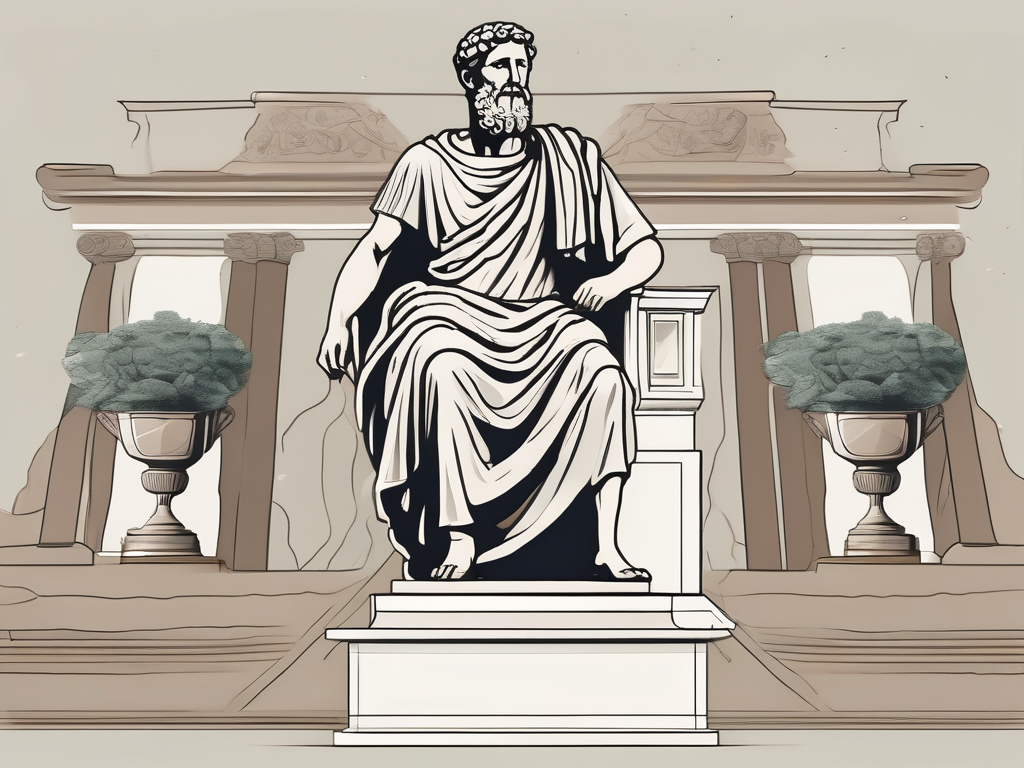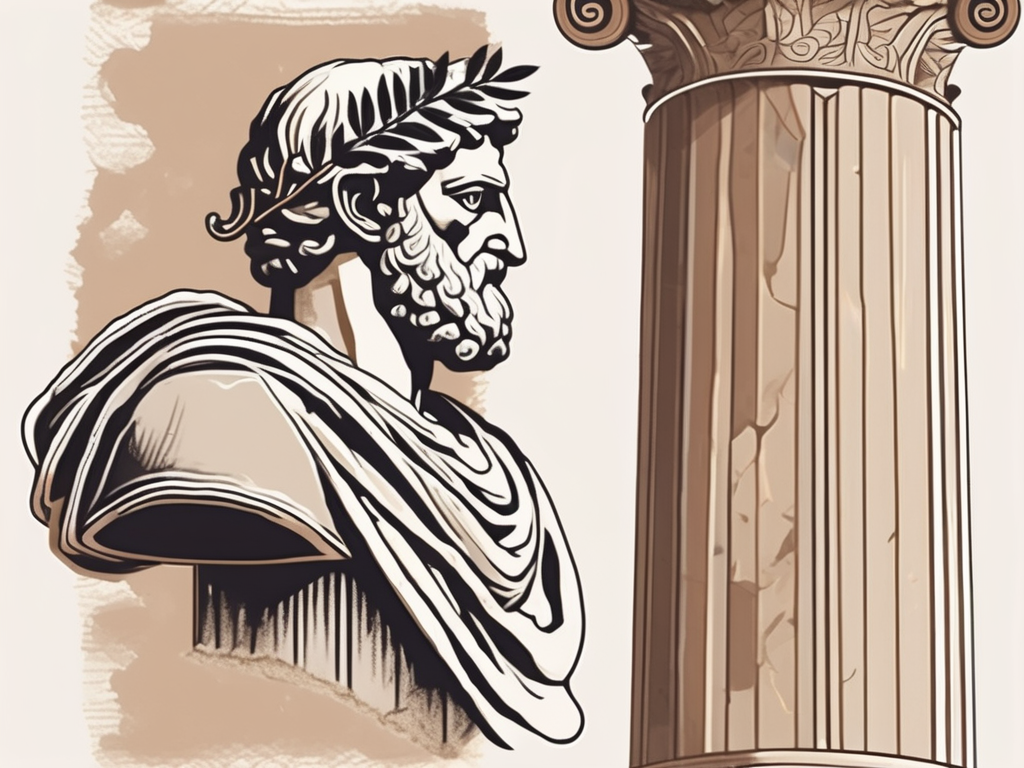Stoicism, an ancient philosophy that promotes virtue, resilience, and inner strength, has inspired countless individuals throughout the ages. One of the most well-known Stoics is Marcus Aurelius, the philosopher-king of ancient Rome. Aurelius’ book “Meditations” has become a timeless source of wisdom, offering profound insights into the human condition and guiding us towards a more fulfilling life. In this article, we will explore ten of his most inspiring quotes, delving deeper into their meanings and the lessons they hold for us today.
Understanding Stoicism: A Brief Overview
Before we delve into the wisdom of Marcus Aurelius, let’s gain a brief understanding of Stoicism. At its core, Stoicism emphasizes the importance of controlling one’s thoughts and emotions, focusing on what is within our control, and accepting that which is not. It encourages us to cultivate a deep sense of gratitude, maintain a moral character, and live in accordance with nature.
In a world that constantly bombards us with distractions and external influences, Stoicism reminds us to turn inward, to find solace and strength in our own minds and souls.
Stoicism originated in ancient Greece, founded by Zeno of Citium in the early 3rd century BC. It gained popularity and influence throughout the Roman Empire, attracting followers from all walks of life, including philosophers, statesmen, and even emperors.
The Stoic philosophy resonated with many individuals because it offered a practical approach to life’s challenges. It provided a framework for navigating the complexities of existence, offering solace and guidance in times of adversity.
The Philosophy of Stoicism
Stoicism advocates for the pursuit of virtue, defining it as the highest good. It acknowledges that we cannot control external events, but we have complete control over our reactions and choices. By aligning our thoughts and actions with reason, we can cultivate a virtuous life.
The Stoics believed that virtue is not merely an abstract concept but a practical guide for living. It encompasses qualities such as wisdom, courage, justice, and self-discipline. These virtues are seen as the foundation for a meaningful and fulfilling life.
This philosophy teaches us to embrace challenges as opportunities for growth, to be mindful of our judgments, and to let go of things beyond our control. It emphasizes the importance of self-reflection, gratitude, and resilience.
Stoicism also emphasizes the interconnectedness of all things. It encourages us to recognize our place in the larger web of existence and to act in harmony with nature. This perspective fosters a sense of humility and a deep appreciation for the beauty and order of the universe.
Marcus Aurelius: A Stoic Emperor
Marcus Aurelius, the Roman Emperor from 161 to 180 AD, was not only a powerful ruler but also a devoted practitioner of Stoicism. Born into an aristocratic family, Aurelius faced numerous challenges throughout his life, including wars, political turmoil, and personal loss. Yet, he remained steadfast in his pursuit of wisdom and virtue.
Aurelius’ commitment to Stoicism is evident in his writings, particularly in his personal journal known as “Meditations.” In this collection of reflections, he explores the nature of existence, the importance of self-discipline, and the impermanence of all things.
Central to Aurelius’ Stoic philosophy was the belief that the true measure of a person lies not in their wealth or social status but in their character. He sought to embody the Stoic ideals, becoming an exemplary leader who ruled with integrity and wisdom.
Despite the demands of his position, Aurelius found solace and guidance in the teachings of Stoicism. He recognized the importance of self-mastery and self-improvement, constantly striving to align his actions with his principles.
Aurelius’ Stoic philosophy not only influenced his own life but also had a lasting impact on the Roman Empire. His reign is often regarded as a period of stability and prosperity, characterized by justice, fairness, and the pursuit of the common good.
Today, Marcus Aurelius is remembered as one of the most prominent Stoic philosophers and a symbol of wisdom and virtue. His writings continue to inspire and guide individuals seeking a meaningful and fulfilling life.
The Wisdom of Marcus Aurelius
The Meditations: A Source of Inspiration
The “Meditations” is a collection of Aurelius’ personal thoughts and reflections. Written as a series of notes to himself, it serves as a guide for personal growth and self-improvement. In this timeless work, Aurelius shares profound insights on how to navigate life’s challenges and find meaning amidst adversity.
As we delve into the pages of the “Meditations,” we are transported into the mind of a philosopher-king. Aurelius, the Roman Emperor, offers us a glimpse into his innermost thoughts, revealing the struggles and triumphs he experienced throughout his life. Through his words, we are invited to embark on a journey of self-discovery and enlightenment.
One of the central themes in the “Meditations” is the impermanence of life. Aurelius reminds us that everything is in a constant state of change, and that the only constant is our ability to control our attitude and response to these changes. This philosophy helps us develop resilience and embrace the transient nature of existence.
As we reflect on Aurelius’ teachings, we are reminded of the beauty and fragility of life. Each passing moment becomes a precious opportunity to learn, grow, and make a positive impact in the world. The “Meditations” encourage us to seize these moments, to embrace the ebb and flow of life, and to find solace in the knowledge that change is inevitable.
The Influence of Aurelius on Stoicism
Aurelius’ teachings greatly influenced the development and spread of Stoicism. His writings provided practical guidance on leading a meaningful life in line with Stoic principles. Aurelius encouraged individuals to focus on introspection, to live with virtue, and to cultivate a deep sense of empathy for others.
Stoicism, a philosophy that originated in ancient Greece, found its champion in Aurelius. His words resonated with people from all walks of life, inspiring them to embrace Stoic principles in their daily lives. Through his writings, Aurelius taught us the importance of self-discipline, resilience, and the pursuit of wisdom.
His emphasis on introspection and self-awareness resonates with modern practices such as mindfulness and meditation. Aurelius believed that by understanding ourselves better, we can gain clarity, make wiser decisions, and live a life of purpose and contentment.
As we explore the impact of Aurelius’ teachings on Stoicism, we uncover a rich tapestry of philosophical ideas that continue to shape our understanding of the world. The principles of Stoicism, as elucidated by Aurelius, provide us with a roadmap for navigating the complexities of life, offering solace and guidance in times of uncertainty.
Through his profound insights and timeless wisdom, Aurelius leaves an indelible mark on the field of philosophy. His words continue to inspire and guide us, reminding us of the power of introspection, virtue, and empathy. The “Meditations” stand as a testament to the enduring legacy of Marcus Aurelius, a philosopher whose teachings transcend time and continue to resonate with seekers of truth and wisdom.
Exploring the 10 Inspiring Quotes
Quote 1: Analysing and Interpretation
One of Aurelius’ quotes that resonates deeply is:
“You have power over your mind – not outside events. Realize this, and you will find strength.”
This powerful statement reminds us that our strength lies within us, in our ability to control our thoughts and perceptions. While we may not have control over external circumstances, we have the power to choose our responses, to find strength in the face of adversity.
When we truly understand that our mindset shapes our reality, we can cultivate resilience and find the strength to overcome obstacles. We can shift our focus from what is beyond our control to what we can change within ourselves.
Quote 2: Analysing and Interpretation
Another inspiring quote from Aurelius is:
“The universe is change; our life is what our thoughts make it.”
This quote urges us to recognize the transient nature of life. Change is inevitable, and we must learn to adapt and flow with it. By recognizing the power of our thoughts, we can shape our experiences and find meaning in even the most challenging circumstances.
Instead of resisting change, Aurelius encourages us to embrace it, to see every moment as an opportunity for growth and transformation. Our mindset determines whether we perceive change as a burden or as a source of growth and possibility.
Quote 3: Analysing and Interpretation
Aurelius once wrote:
“Very little is needed to make a happy life; it is all within yourself, in your way of thinking.”
In a society that often equates happiness with external possessions and achievements, Aurelius reminds us that true happiness lies within. It is not dependent on external circumstances, but on our internal state of being.
By cultivating a positive and grateful mindset, we can find joy in the simplest of things, in moments of connection, and in the beauty of nature. Aurelius encourages us to shift our focus from external desires to internal virtues, reminding us that happiness is a state of mind within our reach.
Quote 4: Analysing and Interpretation
Aurelius wrote:
“You have within you right now, everything you need to deal with whatever the world can throw at you.”
This empowering quote reminds us of our innate strengths and abilities. We often underestimate ourselves and doubt our capabilities, particularly when facing challenges or uncertainties. Yet, Aurelius reminds us that we possess within us the resources to navigate through life’s trials.
By believing in ourselves and trusting our instincts, we can confront adversity head-on and emerge stronger. Aurelius urges us to tap into our inner resilience, reminding ourselves that we are capable of facing whatever challenges come our way.
Quote 5: Analysing and Interpretation
Aurelius once reflected:
“Waste no more time arguing about what a good man should be. Be one.”
With this quote, Aurelius encourages us to focus on our own actions and virtues rather than seeking external validation or debating abstract concepts. He reminds us that true wisdom lies not in words but in embodying and living by our principles.
Instead of getting caught up in philosophical debates, Aurelius urges us to focus on our own character development. By actively living with integrity and compassion, we can make a positive impact on the world.
Quote 6: Analysing and Interpretation
Aurelius once wrote:
“The best revenge is not to be like that.”
This quote highlights Aurelius’ emphasis on self-mastery and the power of personal transformation. Rather than seeking revenge or harboring resentment, he advises us to rise above negativity and lead by example.
By refusing to succumb to the destructive cycles of anger and vengeance, we can break free from negative patterns and actively cultivate peace and understanding. Aurelius reminds us that true strength lies in taming our own ego and responding with kindness, even in the face of hostility.
Quote 7: Analysing and Interpretation
Aurelius once wrote:
“The happiness of your life depends upon the quality of your thoughts.”
With this quote, Aurelius highlights the profound impact of our thoughts on our overall well-being. He reminds us that happiness is not found in external circumstances, but in the way we perceive and interpret those circumstances.
By cultivating a positive and constructive mindset, we can navigate through life’s challenges with grace and resilience. Aurelius encourages us to choose our thoughts wisely and to focus on what uplifts and inspires us.
Quote 8: Analysing and Interpretation
Aurelius wrote:
“The soul becomes dyed with the color of its thoughts.”
This quote underscores the importance of self-awareness and introspection. It reminds us that our thoughts shape our character and influence our actions.
By paying attention to our thoughts and fostering positive mental habits, we can cultivate a virtuous and compassionate soul. Aurelius encourages us to take ownership of our thoughts and to actively nurture a mindset that aligns with our values and aspirations.
Quote 9: Analysing and Interpretation
Aurelius once reflected:
“Very little is needed to make a happy life; it is all within yourself, in your way of thinking.”
In a society that often equates happiness with external possessions and achievements, Aurelius reminds us that true happiness lies within. It is not dependent on external circumstances, but on our internal state of being.
By cultivating a positive and grateful mindset, we can find joy in the simplest of things, in moments of connection, and in the beauty of nature. Aurelius encourages us to shift our focus from external desires to internal virtues, reminding us that happiness is a state of mind within our reach.
Quote 10: Analysing and Interpretation
Aurelius once wrote:
“The only wealth which you will keep forever is the wealth you have given away.”
This quote challenges our conventional notions of wealth and abundance. Aurelius reminds us that true wealth lies not in material possessions but in the impact we have on others and the world.
Through acts of kindness, compassion, and generosity, we can create a lasting legacy. Aurelius emphasizes that the wealth we accumulate in this lifetime is temporary, but the positive impact we make on others’ lives is a legacy that endures.
In conclusion, the ten inspiring quotes by Marcus Aurelius offer profound insights into the power of our thoughts, the importance of self-reflection, and the pursuit of virtue. Aurelius’ teachings remind us that true happiness and strength lie within our own minds and souls. By aligning our thoughts and actions with reason, cultivating resilience, and living with integrity, we can navigate through life’s challenges and lead a more fulfilling life. Let us embrace the wisdom of Aurelius and strive for wisdom, virtue, and compassion in our daily lives.












